Sandwich tzedakah has inspired countless congregants in the past 10 years
Story and photography by Michael C. Butz
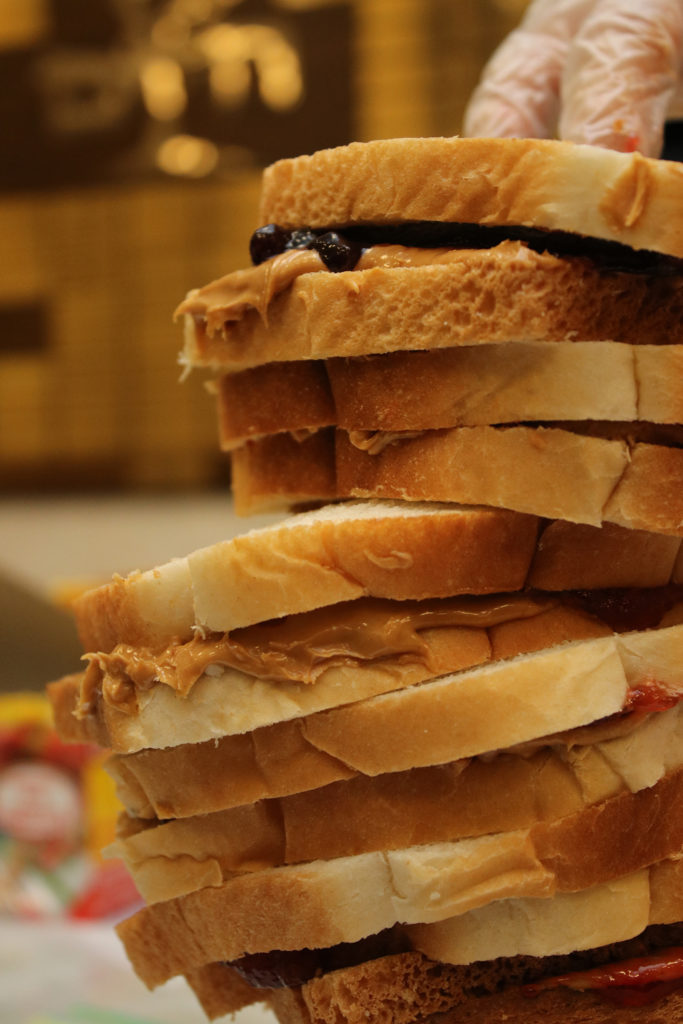
The last place one might expect to find someone from the Jewish community during Shabbat is the dimly lit back parking lot of a Cleveland church. But that’s exactly where three Temple Israel Ner Tamid congregants – and their rabbi – were on an unseasonably cold Friday night in mid-November.
In fact, churches, shelters and transitional housing units – any place that provides sanctuary to Northeast Ohio’s homeless – is where members of the Reform temple in Mayfield Heights have been going every Friday night for a decade.
The reason for their weekly visits? In a word, tzedakah.
More formally, it’s to carry out acts of charity by way of the temple’s Peanut Butter & Judaism program, through which temple members make and deliver peanut butter and jelly sandwiches – typically 150 to 200 each week – to those in need.
“Tzedakah, making the world a better place, is part of our mission as a congregation,” says Rabbi Matthew Eisenberg, the temple’s spiritual leader. “This is what we do.”
That’s true. The “small but mighty” congregation of about 240 families – Eisenberg says “it’s like The Little Engine That Could” – has a history of helping others. Notably, Temple Israel Ner Tamid packed six semi-trailer trucks with goods to aid victims of Hurricane Katrina in 2005 and responded similarly to hurricanes Harvey, Sandy and others. It’s currently working with an outside charity to send refrigerators to Puerto Ricans whose electricity is slowly being restored following hurricanes Irma and Maria, which wiped out power across the island in 2017.
But where those examples of compassion and kindness assist others in faraway places in response to sporadic natural disasters, Peanut Butter & Judaism has been a model of consistency in helping those closer to home endure the pervasive challenges of hunger and homelessness.
What’s more, it clearly resonates with congregants in a meaningful way. So much so that during the Shabbat service on Dec. 14, they’ll celebrate the program’s 10-year anniversary.
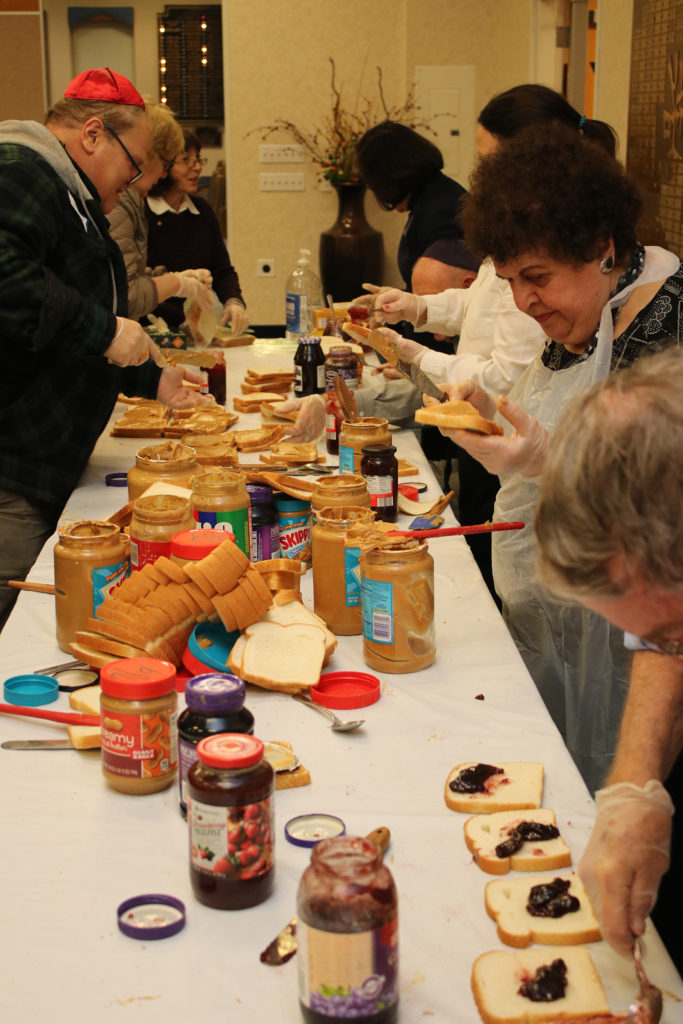
Extending helping hands
The business card Peter Freimark hands to those he meets doesn’t list a job title or company name. Instead, it lists a calling: “I help other people.”
Freimark, whose gentle demeanor and soft-spoken nature make him immediately approachable, has been a driving force behind many of the temple’s disaster relief efforts, and it was he who started Peanut Butter & Judaism a decade ago. The idea came to him during a hazardous drive along a snow-blanketed Interstate 480 that December.
“I just thought to myself, ‘There are all these homeless people who are going to be on the streets this cold, snowy night, and I get to go home, take a warm shower, have a refrigerator full of food and sleep in a comfy bed. The least I can do for them is see if I can get them some food,’” he says. “I decided to buy some peanut butter, jelly, bags, bread and gloves and asked the rabbi’s permission because I felt it would be a real nice thing to not only pray, not only eat, but to do something tangible for other people.”
Eisenberg recalled his answer to Freimark was, without hesitation, simply “yes.”
“As you find in life, there are people who talk about (tzedakah), or there are people who do it, or there are people who talk about it and do it,” he says. “At a small congregation, you can become an active participant very easily. And when somebody comes up with an idea, if it sounds like an interesting and significant idea that will be kind of low-tech and touch people’s lives, there really is only one good answer. It isn’t ‘maybe.’ The answer is ‘yes.’”
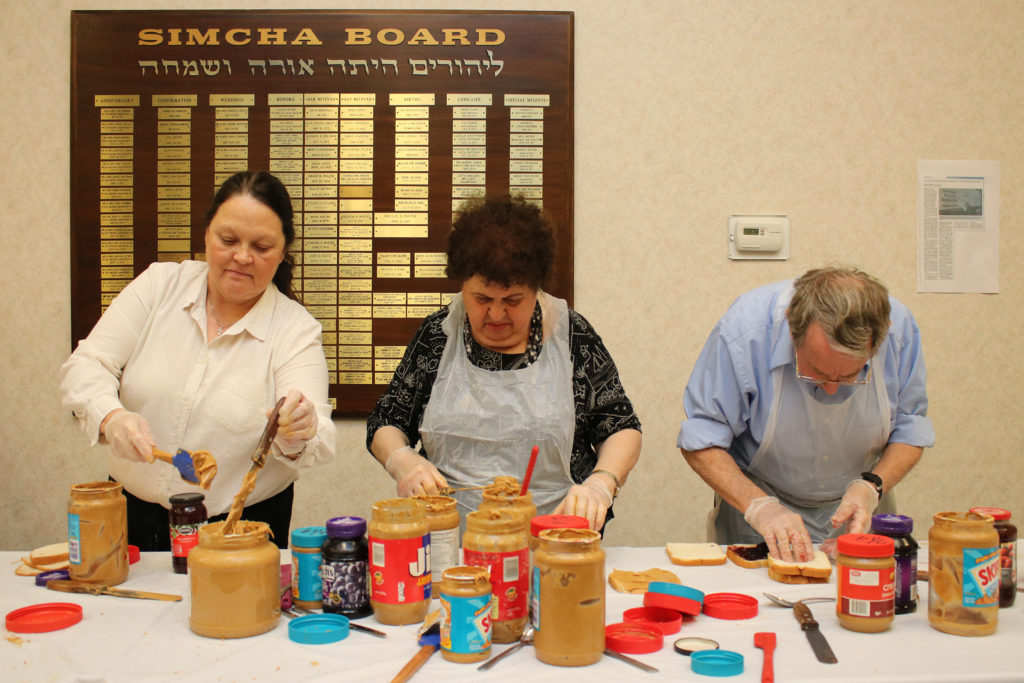
Sandwiches were made and taken to downtown Cleveland, and with that, their outreach began. Congregants exhibited even more enthusiasm for the project the following week, Freimark says, and over the course of 10 years, the temple has never missed a Friday of delivering peanut butter and jelly.
“I can’t recall any Friday night – and there have been ones where the drive has been interesting – when we’ve said, ‘No, the weather is too bad,’ because we know they’re out there,” he says. “If they can be out there, certainly we can be (too).”
Special events haven’t interrupted Peanut Butter & Judaism either, says Freimark, noting those with a Friday night simcha planned know in advance that sandwich making will take place during – or be a part of – their celebration. He thinks the reason the program has been embraced is straightforward.
“I think the main reason we do it is the simplest of reasons: It’s the right thing to do. You can get very philosophical about it, and there’s nothing wrong with that, but if you break it down to its simplest form, everybody needs to eat every day of the year. And some of these people – for whatever reasons, and there are a lot of reasons – are unable to. Rather than blaming them or questioning them, and no matter what your age or what your situation is, if you need food, we’re going to give you a sandwich or two.”
Freimark feels congregants also enjoy that their efforts through Peanut Butter & Judaism go directly to those in need. Temple members either buy all of the food and supplies or solicit donations from local stores and cafes, and all of the labor is volunteer. In other words, he says, there’s “zero overhead.”
“People really feel they’re doing something to help humanity,” he says. “And for people downtown, or wherever we take them, to know someone they’ve never met cared enough to do something, I think that has to be something that makes them feel a little better and suffer a little less a little sooner.”
Though the program started with him, Freimark concedes he doesn’t make the trip downtown as frequently as he used to.
“Because during the early years, I did it almost every week myself or with someone else, I try to let other people have the experience,” he says. “I certainly don’t go out anywhere near what I used to – and that’s OK. We have a lot of people, a lot of volunteers.”
Acting out altruistically
One such volunteer is Brett Lipton, whose personality is as big as his 6-foot-2 frame. As chairman of the temple’s sandwich committee, he ensures supplies are in stock and orchestrates the post-Shabbat service sandwich making. He finds personal fulfillment through his position, which he’s held for about five years.
“It gives me purpose,” he says. “I’m depended on. That’s a good feeling, to be depended on by multiple people.”
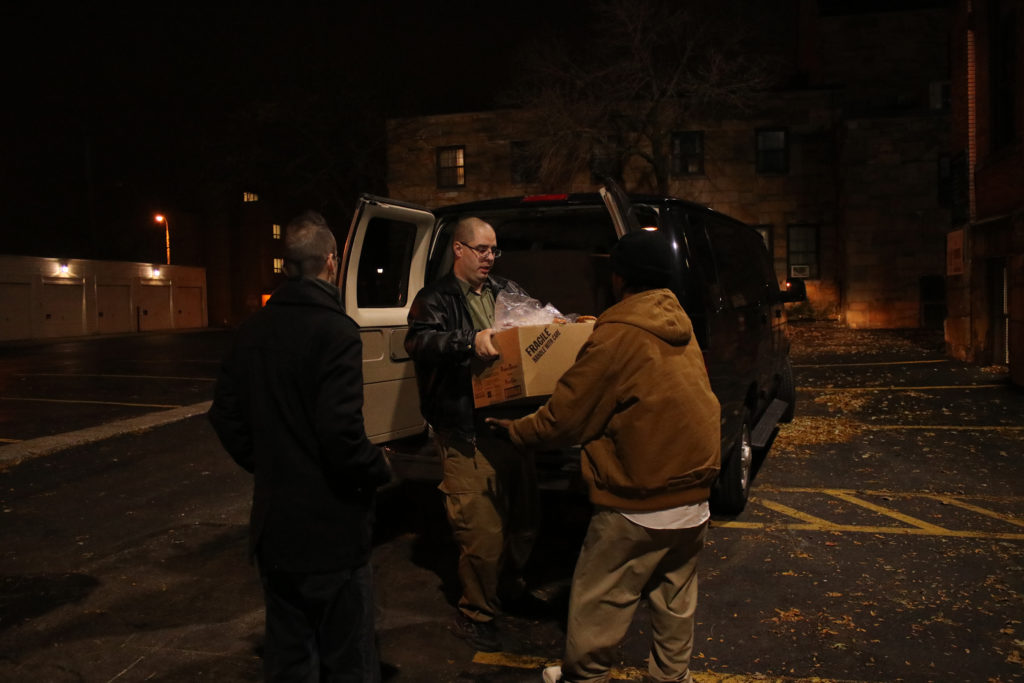
Directed by Lipton, the sandwich assembly line is a sight to behold. On that mid-November Friday night, the degree of efficiency and sense of purpose with which about a dozen congregants produced peanut butter and jelly sandwiches would have been the envy of any industrial manufacturer. When the dust settles each week, they’ve used 15 to 20 loaves of bread and about a dozen jars each of peanut butter and jelly.
Lipton also often leads the trips to Cleveland, though on this night, it was Eisenberg – donning a Brandeis blue Temple Israel Ner Tamid ball cap that says “Be a mensch” across its front panels – behind the wheel of the temple’s multipurpose delivery van.
The first stop was at St. Malachi Parish, near the busy intersection of Detroit Avenue and West 25th Street in Cleveland’s Ohio City neighborhood. There, the nonprofit Metanoia Project organizes a shelter that’s open only during Northeast Ohio’s cold-weather months for homeless people unwilling or unable to access other facilities. This night was the first of the season it was open.
Lipton and Shaun Friedman, one of the temple’s religious school teachers, were greeted by shelter representatives and exchanged introductions. They then carried boxes of peanut butter and jelly sandwiches inside the parish, which teemed with overnight inhabitants.
The encounter was brief but the exchange was significant and meaningful.
From there, the team, which included congregant Jennifer Woo, drove around the church to look for those who sought refuge outside. They then drove around Public Square and Mall A in downtown Cleveland to do the same.
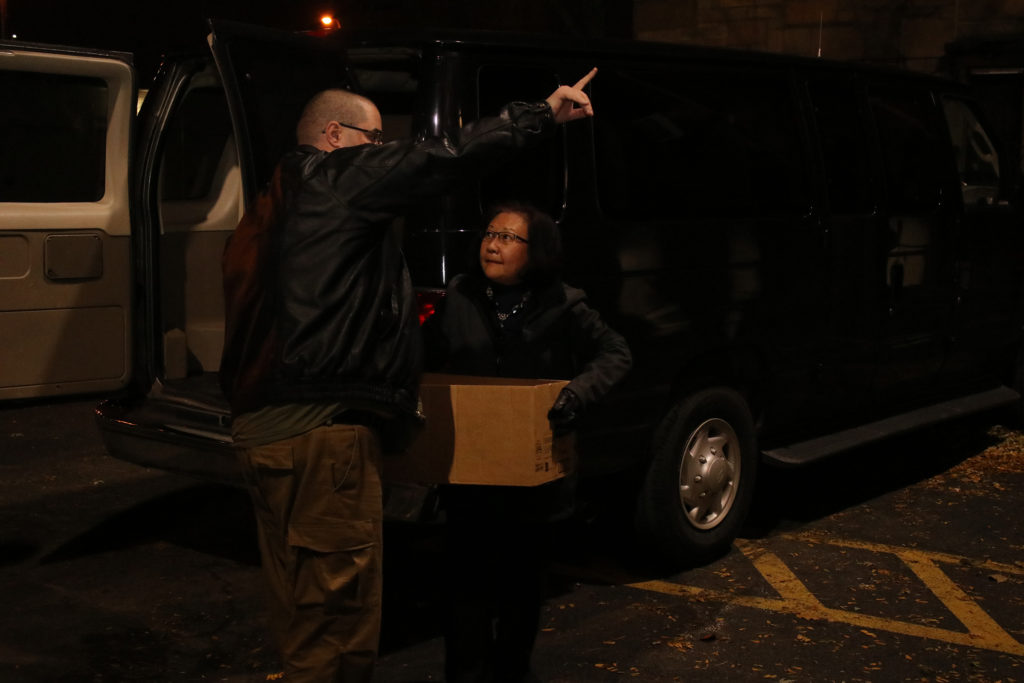
When they find homeless who might be sleeping on the streets, which they did, they’re careful not to disturb them. Instead, they’ll leave a sandwich or two near the man or woman so they’ll see them upon waking.
As Freimark explained earlier that night, “We’re not looking for recognition, we’re not looking to pity them, we’re trying to help them.”
A final delivery that night was made on the outskirts of downtown at North Point Transitional Housing, where all remaining sandwiches were left.
Shabbat service that night started at 7:30. The sandwich making began at about 9:45, and by the time the van returned to Temple Israel Ner Tamid from Cleveland, it was midnight. Their commitment of time, energy and resources is a testament to who they are.
“The Jewish people have a mission. We’re supposed to be a light unto the nations,” Eisenberg says. “When you do good things, you shed light. It illuminates dark places. This is what you’re supposed to do.”
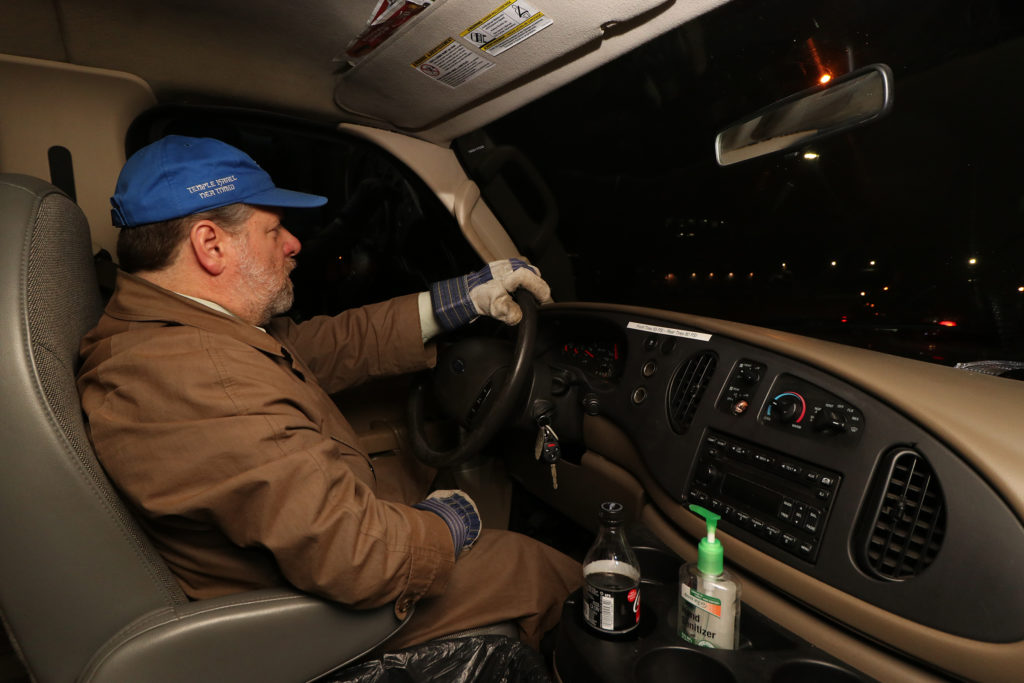
Learning life lessons
Instances of homelessness can be found throughout Jewish history, from Adam and Eve being expelled from the Garden of Eden to the Israelites wandering in the wilderness for 40 years to a universal sense of homelessness that persisted until 1948, when the state of Israel was established.
In that sense, Jews can readily relate to the challenges, and to many, combating them is a calling. Eisenberg’s sermon that night covered themes related to charitable giving, and even before that, passages like “We are Israel, schooled in the suffering of the oppressed” and “You shall not stand idle while your neighbor bleeds” were read responsively from the siddur.
“The kinds of eternal truths about, you know, to love your neighbor as yourself, from Leviticus 19:18 – as true as that was thousands of years ago, it’s true today,” Eisenberg says. “And most of these people, they’re my neighbors. I don’t live near them, but they’re human beings endowed with a spark of divinity, and we have to take care of one another. That’s the way we think about it in Judaism.”
Freimark feels participating in Peanut Butter & Judaism has helped fellow congregants better understand what it looks like to achieve that ideal.
“The closer contact you have with people, the more you realize we have a shared humanity. Sometimes, if you get someone else to paint a picture of who people are, there can be negative stereotypes that are not true,” he says. “We should only love other people. We should love other peoples, too – and poor people are a class, homeless people are a class. There are some great people out there who are homeless, and there are some not-great people – but they’re still people. We need to welcome the stranger in many different ways.”
Eisenberg thinks Peanut Butter & Judaism has taught his congregation meaningful life lessons.
“Most of the kids in our religious school, and even most of the adults, we live in fairly comfortable surroundings. If you get out of your comfort zone a little bit and go into the city, where there is real difficulty for people … we can help people,” he says. “And when you view this, when you participate, it gives you a sense of humility. It humbles you – if you’re open to that. You kvetch less about your own circumstances because you’ve been reminded of how far you can fall – and thank God you haven’t fallen that far. You have your own aggravations, everyone has mishegas, but it could be far worse for you. Be grateful for what you have. Every week, this drive is a reminder of that.”
New wheels for more meals
The van Temple Israel Ner Tamid uses to deliver its peanut butter and jelly sandwiches has an appropriate vanity license plate: “PBNJ 4U.”
The plate adds to the van’s personality, but other traits – like the traction control alert system that, without exception and regardless of driving conditions, delivers a shrill 30-second alarm every five minutes – are less charming.
“Usually, I start singing a Hebrew song and it’ll turn off eventually,” says Rabbi Matthew Eisenberg, explaining his coping mechanism. “Otherwise, this thing drives me crazy.”
He also slaps the dashboard to keep a beat while he sings – an action that grows more forceful as the 30-minute drive from Mayfield Heights to downtown Cleveland progresses.
The van – a 2007 Ford Econoline that also transports the temple’s religious school children on trips – has seen better days. It has 264,000 miles on it and requires $1,000 to $2,000 in repairs and maintenance each year.
“With all of the mileage and new parts that are now old parts, it just seems like we need something newer,” Eisenberg says.
So, in October, the temple started a GoFundMe campaign in hopes of raising $15,000 toward a van.
One was found – on Dec. 4, Eisenberg was scheduled to pick up a 2014 Chevrolet Express with only 40,000 miles on it – but funds are still needed to help pay for it. As of early December, $1,170 had been pledged toward the campaign goal.
The temple’s longtime van was obtained by a congregant four years ago through phil•an•thro•pi•a, Executive Caterers president and founder Harlan Diamond’s annual community fundraising event at Landerhaven. A local taxi company donated several used vehicles that year, and the van relieved congregants from using their own cars and trucks to make the weekly trip downtown on behalf of Peanut Butter & Judaism.
For more information or to donate to Temple Israel Ner Tamid’s campaign for a new van, visit bit.ly/TINTvan. js
